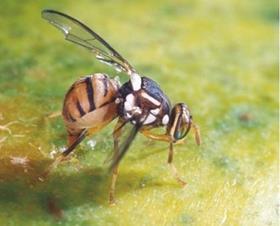
Coleacp, the Brussels-based organisation that defends the interests of producers in Africa, the Caribbean and the Pacific (ACP), is continuing its efforts to assist West African mango farmers against the threat of fruit flies. The issue has led to a ban on imports of infested fruit into the European Union, with border inspectors destroying entire batches if any sign is discovered, causing significant losses for farmers. Such is the seriousness of the problem that efforts have recently been stepped up to tackle it. Coleacp is part of the consortium selected to support the fight in the 15 countries of the Economic Community of West African States (ECOWAS).
“This five-year project is funded by the European Union and the French Development Agency, and aims to bolster the regional pest control plan launched by ECOWAS in 2010,” says Coleacp’s communications manager, Emmanuel Bourcelet. “The new programme targets fruit and vegetable producers, mainly of mangoes, with a view to curbing the loss of revenue due to fruit infestations. This will require developing effective control measures and organising their equally effective distribution to farmers.”
Such projects are typical of Coleacp, whose aim is to take make advances in agronomy available to farmers and agricultural businesses in ACP countries. The organisation’s research increasingly emphasises protection methods that reduce the risks associated with the use of toxic substances, such as the use of integrated pest management and biological agents and products.
“Most of these projects aim to find the best way to protect a crop against a pest or a disease,” says Bourcelet. “This involves identifying a solution that is effective against the threat, safe for people and the environment and with no consequence for the subsequent marketing of products. To get there, the researchers generally conduct a series of field trials and recommend the ones that best fit the demands of ACP producers.”
According to Bourcelet, Coleacp has contacted 40 manufacturers of “biopesticides” since 2012 in order to learn about their potential for ACP producers. In field trials, the organisation’s R&D department compares their performance with that of conventional active substances. Biostimulants, biofertilisers and composts are also gaining increasing attention for their use in enhancing a plant’s resistance to particular pests and diseases.
“These non-conventional products have the advantage of espousing the principles of corporate social responsibility, as they provide pest management solutions that are more environmentally friendly, safer for farmers and their families and often less harmful to the health of consumers,” says Bourcelet. “Once the solution is identified, it is obviously crucial not to let it get buried in a scientific report. So another important task for the R&D department is to publicise the findings of its tests and research, making them available to ACP sectors.”






No comments yet